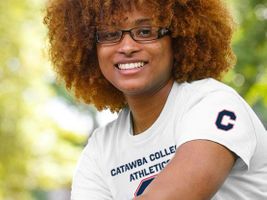Prior to the advent of the 2014-2015 academic year, Catawba College first-year students and other members of the campus community will be reading the transcript of a 2005 Kenyon College commencement address written and delivered by now-deceased author and former college professor David Foster Wallace. Wallace's address, "This is Water," is Catawba's Common Community Readingfor 2014.
Delivered at the conclusion of the college careers of Kenyon College's 2005 graduating class, incoming Catawba students will have an opportunity to ponder Wallace's words at the beginning of theirs. Faculty and administrators involved in the development of Catawba's First-year Experience have provided a reading and study guide for the Common Community Reading that helps direct students in preparing for the text.
The study and reading guide encourages students to learn more about Kenyon College and David Foster Wallace and to ponder why he was asked to deliver the commencement address at this institution. The guide also asks them to consider their thoughts on what it means to be educated in relation to Wallace's own contention of what it means.
Wallace's remarks are peppered with both high level vocabulary and street vernacular as he expounds on his premise of what education means and what it enables its possessors to discern and do:
"And I submit that this is what the real, no bullshit value of your liberal arts education is supposed to be about: how to keep from going through your comfortable, prosperous, respectable adult life dead, unconscious, a slave to your head and to your natural default setting of being uniquely, completely, imperially alone day in and day out," Wallace wrote and said to those gathered in Gambier, Ohio on May 21, 2005 for Kenyon's commencement exercise.
"This, I submit, is the freedom of a real education, of learning how to be well-adjusted. You get to consciously decide what has meaning and what doesn't. You get to decide what to worship.
"The really important kind of freedom involves attention and awareness and discipline, and being able truly to care about other people and to sacrifice for them over and over in myriad petty, unsexy ways every day.
"That is real freedom. That is being educated, and understanding how to think. The alternative is unconsciousness, the default setting, the rat race, the constant gnawing sense of having had, and lost, some infinite thing."
In an October 2008 Rolling Stone article written after Wallace's suicide, writer David Lipsky described Wallace thusly: "His life was an information hunt, collecting hows and whys. 'I received 500,000 discrete bits of information today,' he once said, 'of which maybe 25 are important. My job is to make some sense of it.' He wanted to write 'stuff about what it feels like to live. Instead of being a relief from what it feels like to live.' "
Catawba's Common College Reading Program, started in 2005, is an initiative intended to get incoming first-year students talking about important issues. The program affords an opportunity to participate in and contribute to the intellectual life of the college before students arrive on campus and provides them with a shared academic experience during orientation and the first semester.
Catawba's previous common reading texts have included "Why Things Bite Back" by Edward Tenner (2005); "Kite Runner" by Khaled Hosseini (2006); "Mountains Beyond Mountains" by Tracy Kidder (2007); "We Are All the Same" by Jim Wooten (2008); "In the Hot Zone: One Man, One Year, Twenty Wars" by Kevin Sites (2009),"Three Cups of Tea" by Greg Mortenson (2010), "Zeitoun" by Dave Eggers (2011), "The Checklist Manifesto" by Atul Gawande (2012), and "The Real Work: Modern Magic and the Meaning of Life" by Adam Gopnick (2013).
Ketner School of Business 2014 Common Summer Reading
Current Catawba students enrolled in upper level business and communication courses will also read a common text in preparation for their fall courses. They'll tackle John C. Maxwell's "How Successful People Think: Change Your Thinking, Change Your Life."
Members of the Ketner School of Business' Advisory Board Common Summer Reading Committee suggested the title after reviewing potential books.
A Wall Street Journal bestseller, "How Successful People Think," includes lessons on how to be more creative and when to question popular thinking. It postulates 11 keys to more effective thinking for its readers.
An online discussion regarding the text is available to readers on the Ketner School of Business Facebook page.
